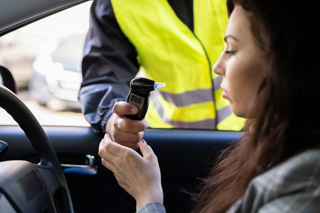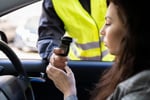Footage has been released by National Highways of a series of incidents captured by police in unmarked cabs, ahead of a week of action on the M1.
The unmarked HGVs have recorded 33,234 offences patrolling motorways and major A roads across England since the scheme, known as Operation Tramline, launched in 2015.
The vehicles, known as ‘supercabs’, have been funded by National Highways and have been used by police forces across the country.
They allow police officers to film evidence of unsafe driving behaviour by pulling up alongside vehicles, and drivers are then pulled over by police cars following a short distance behind.
The unmarked cabs have a de-restricted speed limiter which means they can travel at speeds up to the national speed limit, and flashing lights have been installed for use by police forces in an emergency.
National Highways head of road safety, Jeremy Phillips, said: “We are committed to reducin the number of people killed or seriously injured while travelling on our roads by 50% by 2025 and we have a long-term ambition for zero harm.
“To achieve that we need to tackle the unsafe driving behaviour that we sadly still encounter.”
From the elevated position in the HGV cab, officers can spot unsafe driving behaviour – whatever vehicle the motorist may be in.
The most common offences are not wearing a seatbelt (9,962) and using a mobile phone (8,368) followed by 2,257 who were not in proper control of their vehicle.
Consequences for drivers range from warnings to fixed penalty notices, court summons or arrest.
Police target drivers on the M1
Officers from eight different police forces will be patrolling the M1 between London and Leeds from Monday (March 6) to Sunday (March 12) looking out for incidents of illegal driving.
The aim of the multi-agency Week of Action on the M1 – which has been labelled Operation Freeway - is to reduce the number of incidents on the motorway.
In 2022 there were 73,593 incidents on the M1 – more than 200 incidents every single day.
There were 4,087 traffic collisions on the motorway last year.
Phillips continued: “Hundreds of thousands of drivers use our roads every day and the vast majority are sensible behind the wheel but some are putting themselves and others at risk.
“Through this week of action we want to encourage motorists to think about their driving and to adopt safer behaviours.
“But those who continue to pose a risk should be aware that we are working with our police partners to make sure they are spotted and prevented from causing serious harm to themselves or others.”
Car transporter driver uses elbow to steer
In the latest footage, released by National Highways, police officers overtaking a heavily-laden car transporter were shocked to discover the driver was using just one elbow to control the vehicle as he travelled the M40 near Gaydon in Warwickshire.
Footage of a number of incidents captured by police officers in the unmarked cabs has been released by National Highways ahead of a week of action along the length of the M1.
They include a driver at the wheel of a horsebox on the A46 Coventry Eastern Bypass texting on his mobile phone and not wearing a seatbelt.
Meanwhile, another driver was caught on camera holding up her mobile phone in her right hand as she drove along the M40.
Police forces taking part in Operation Freeway on the M1 are – West Yorkshire, South Yorkshire, Nottinghamshire, Derbyshire, Northamptonshire, Hertfordshire, Thames Valley and Bedfordshire, as well as the Leicestershire Road Safety Partnership.
In addition to the HGV cab patrols, partners taking part in the week of action and National Highways traffic officers will be present at motorway services offering advice to drivers and carrying out vehicle checks.
National Police Chiefs’ Council lead for roads policing operations, Commander Kyle Gordon, said: “We are pleased to be working with our key partner National Highways once again as we work to reduce the danger caused on one of our busiest roads, and beyond, by drivers who allow themselves to be distracted while driving.
“Too many people are killed or seriously injured on our roads every year.
“My officers have to visit the families of those killed on our roads, 5 times a day, every day of the week and every month of the year.
“I am very happy to support all initiatives that can help reduce these numbers.”






















Login to comment
Comments
No comments have been made yet.